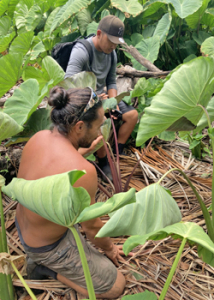How food is grown, distributed and consumed around the world has an enormous toll that hits the environment and communities worldwide. A 2023 report by the United Nations Food and Agriculture Organization found that the world's current agri-food systems impose hidden costs equivalent to over $12.7 trillion a year, or 10% of the global gross domestic product. The hidden costs lead to unhealthy diets, leading to obesity and chronic illnesses that take employees away from work.
The challenges of these agri-food systems has inspired the University of Hawaiʻi to create the Ke Ō Mau Center for Sustainable Island Food Systems to focus on improving the local food system in the islands.

Worldwide, low-income countries suffering from poverty and undernourishment are especially impacted. Agricultural production is also degrading ecosystems through land-use changes, biodiversity loss, freshwater resource exploitation, soil erosion, greenhouse gas emissions, and water pollution from fertilizers and pesticides.
Developing sustainable agri-food systems can play a crucial role in achieving socio-ecological health, equity, resilience, and sustainability, supporting the UN Sustainable Development Goals (SDGs).
Holistic and collaborative solutions
These pressing global issues, along with local food system challenges, have led to the development of the UH Ke Ō Mau Center for Sustainable Island Food Systems. The soon-to-be research, education, planning, and policy hub will focus on improving the local food system in Hawaiʻi.
Led by UH West Oʻahu Associate Professor Albie Miles and UH Mānoa Associate Professor Noa Lincoln, the center will be a cross-campus and community-engaged collaboration addressing pressing problems in food and agriculture in Hawaiʻi and beyond.
Examples include Miles' collaborative food system planning effort with the Hawaiʻi Public Health Institute that is funded by the U.S. Department of Agriculture Regional Food Systems Partnerships Program and the W.K. Kellogg Foundation. Throughout the last three years, this project has convened thousands of food system stakeholders around the state and increased legislative engagement through the annual Hawaiʻi Food System Summit.
Lincoln's collaboration with the Hawaiʻi Food Hub Hui has supported data analysis, impact measurement, and public awareness, leading to financial support for the continued growth of Hawaiʻi food hubs.
"With significant hidden costs and the growing risk of climate destabilization, we need to work toward healthy, equitable, resilient, and sustainable food systems," Miles said. "Integrated research, education, and planning are essential to inform public policy and private-sector investment toward transforming our food system."
For more, see Noelo's story . Noelo is UH's research magazine from the Office of the Vice President for Research and Innovation .
The post New UH center aims to transform agri-food systems first appeared on University of Hawaiʻi System News .






